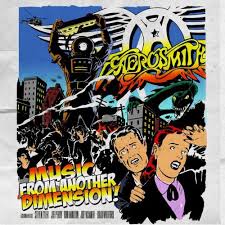 Black metal should have stopped here. Welcome to Hell is nasty, vituperative, and evil, but lots of bands have copied its tricks over the years, usually without adding anything to them, and the result is one of metal’s more annoying subgenres. Welcome to Hell is a comedian delivering a punch-line. Modern black metal is that same comedian rambling on uselessly after he’s gotten his big laugh.
Black metal should have stopped here. Welcome to Hell is nasty, vituperative, and evil, but lots of bands have copied its tricks over the years, usually without adding anything to them, and the result is one of metal’s more annoying subgenres. Welcome to Hell is a comedian delivering a punch-line. Modern black metal is that same comedian rambling on uselessly after he’s gotten his big laugh.
It has overdistorted guitars, a bass tone that sounds like a metal bat being destroyed by an angle grinder, and lyrics about satanism etc delivered in a self-conscious, humorous way. Venom don’t take themselves very seriously, unlike most of the bands they’ve inspired. All they do here is rock out and have fun.
Some bands have songwriting, but Venom has something more akin to songscribbling or songdoodling. None of them know a single damn thing about music, they’re all just making it up as they go along. As a result, they ignore a lot of common sense songwriting tricks. The title track begins with That Omnipresent Metal Riff (“Flash Rocking Man” by Accept, “Overnight Sensation” by Motorhead, “Fly to the Rainbow” by At Vance, “2 Minutes to Midnight” by Iron Maiden, “Midnight Chaser” by White Spirit, hundreds of others) and it sounds groovy and catchy rather than agitated, which makes the sudden resolution of the chorus feel a bit unearned. This kind of chorus is meant to dissipate tension, only here there’s no tension to dissipate – and it strikes the ear as odd. Yet, it’s an interesting effect. The way Conrad Lant and friends ignore the rulebook is part of the album’s appeal.
Most of the songs are constructed like punk rock: blisteringly fast, with as few riffs as possible, and a vocal performance that has energy and power to commend it. “One Thousand Days in Sodom” and “In League With Satan” break up the speed with an excruciating mid-tempo burn, but they are equally destructive and chaotic. Some of the songs don’t sound particularly memorable, but the impression Welcome to Hell leaves is of 39 minutes of unstoppable momentum. This album’s an irresistible force, so where’s an immovable object?
Welcome to Hell’s raw aesthetic might not have been intentional. The album was recorded in just three days, ostensibly as a demo, but the label made the decision to release it as an album, using a drawing of Conrad’s that had been used as a previous single cover.
But that too might be more power to Venom’s elbow, that they got an album out as quickly as they did. Venom’s 1981 release date is powerful cachet. A 1982 or 1983 release date would take them uncomfortably close to Slayer, and Sodom, to say nothing of Bathory (what would those bands have sounded like without Venom’s influence, though?)
Black metal is a self-loathing genre filled with people who take pride in making shitty music nobody likes and nobody listens to, but it wasn’t always this way, and Venom proves it.
 Mark Twain once made a funny joke about “idiot member of Congress” being a tautology. I could make a joke about “Aerosmith comeback album” being another tautology. It wouldn’t be funny, though. The joke has been going on for thirty six years, and repetition is the enemy of humour.
Mark Twain once made a funny joke about “idiot member of Congress” being a tautology. I could make a joke about “Aerosmith comeback album” being another tautology. It wouldn’t be funny, though. The joke has been going on for thirty six years, and repetition is the enemy of humour.
Basically, Aerosmith cut some albums in the mid seventies and have spent the next four decades trying to escape their shadow. Nearly every Aerosmith album since Rocks has been considered a comeback effort by someone, somewhere…each comebackier than the last, and each more easily forgotten by the time the next one rolls around. The band has been unable to make lightning strike twice, with their output ranging from okay (Draw the Line), to uninspiring (Done with Mirrors) to revolting (I do want to miss a thing…that hellish song…).
To be fair, they managed a fairly legit comeback with Pump, which had the scorching “F.I.N.E.” and “Janie’s Got a Gun”, a song that even people that hate this band often like. But given their track record, does Aerosmith really have the air (aer?) of a rock and roll legend? Honestly, they seem more like a decent band that sometimes gets lucky.
Music from another Dimension is AC/DC’s Black Ice all over again. It’s clearly written by the same band that once put out classics, and it’s clearly not destined to join them. “Love XXX” sports a catchy main riff but doesn’t really go anywhere. “Legendary Child” has Perry reaching into his bag of tricks and coming out with an interesting harmonised lick. This song sounds greasy and driving and would have made good filler on Toys in the Attic.
“Street Jesus” is good – fast and furious, like “Rats in the Cellar”. The only thing that hurts it is the clean and slick production. Aerosmith’s music used to sound hard enough to cut a De Beers diamond, not nice and inoffensive. This is music that bows and scrapes and asks “Please sir, may I have permission to rock?” “Something” is a weird and sprawling thing redolent of Magic Mystery Tour-era Beatles.
By “Up on the Mountain” we’re on to the blatant idea recycling, with the band writing “Love XXX” all over again as if they’d forgotten that they’d already recorded that one. “Lover Alot” is silly fast rock with none of the old Aerosmith bite. Unfortunately, the band doesn’t restrain itself to “boring”, some songs here are actually repulsive. “Beautiful” has some brash swagger mixed with a godawful annoying chorus that sounds like Creed gone even more wrong. “We All Fall Down” is a slow dance piano ballad written by that chick who wrote “I Don’t Want to Miss a Thing”…good, just what Aerosmith fans want to hear.
That they’re still coasting on Rocks’ glory thirty seven years later is a favourable comment on the quality of their early albums. Will those days ever be revisited? I will never say never, but it hasn’t happened here. Forget writing the anthems of an age. Aerosmith is struggling to write the anthems of the next five minutes.
 Metal has two taxonomies: the sort with ballads, and the sort without. Demolition Hammer is part of the second sort. There’s not a lot of music here to show your girlfriend, although if the timing’s right she might relate to “Infectious Hospital Waste.”
Metal has two taxonomies: the sort with ballads, and the sort without. Demolition Hammer is part of the second sort. There’s not a lot of music here to show your girlfriend, although if the timing’s right she might relate to “Infectious Hospital Waste.”
Tortured Existence is the first of Demolition Hammer’s three albums. The third sounds like Pantera/Prong mixed with the shitty sixth Ministry album. The second is a thrash metal coat of many colours, influenced by Slayer, Sepultura, Dark Angel, and others. The first album, however, has tunnel vision for a single style, New York brand thrash. Demolition Hammer don’t do anything original, but they sound inspired and energetic.
The riffs are aggressive and unrelenting, similar to Stormtroopers of Death and Nuclear Assault and various other bands from The City That Never Sleeps (Because You’re Playing Metal Too Loud). The production has an odd character. The guitars are loud and guttural, with the mids EQ’d away, giving them a crushing but not very heavy aesthetic – listen, and judge for yourself. Tortured Existence feels like being strangled by a warm, soft paw.
The songs all sound similar, but to the attuned ear there’s variation. “44 Calibre Brain Surgery” is the craziest track, “Crippling Velocity” is the fastest, and “Infectious Hospital Waste” is the catchiest, with most of the other songs walking the territory in between. The songs stick to a formula of punishing riffs interspersed with lead breaks interspersed with barked vocals interspersed with gang shouts. And then, just as this album’s one trick is getting dull, it all ends.
Derek Sykes and James Reilly are a tight rhythm team. The deceased Vinny Daze is an able drummer, although unworthy of the embarrassing levels of praise heaped upon him by some members of the online metal community. I think he suffers from Dead Rockstar Syndrome, where talented, above-averaged musicians like Cliff Burton and Randy Rhoads get hagiographed into musical geniuses. Steve Reynolds barks out lyrics about social, political, and medical aberrations with a distinct Australian-sounding accent.
Tortured Existence was released in a year starting with “199-“, so the timing could have been better for this band. Rather than riding the upward surge of thrash, they had their halcyon days right when the genre was shutting down. They were consigned to cult band status when they had the talent and potential to be much more. They soldiered it out for two more albums (the last one being a horrible attempt at ripping off Pantera), then broke up. There was a cash-cow anthology release from Century Media in 2008 (publically disowned by Derek Sykes), and that’s it for these guys.
For now, though, the Demolition Hammer crashes down. It’s a solid release that deserves its cult status. You could never call it a game changer, but some games aren’t meant to be changed.
 Black metal should have stopped here. Welcome to Hell is nasty, vituperative, and evil, but lots of bands have copied its tricks over the years, usually without adding anything to them, and the result is one of metal’s more annoying subgenres. Welcome to Hell is a comedian delivering a punch-line. Modern black metal is that same comedian rambling on uselessly after he’s gotten his big laugh.
Black metal should have stopped here. Welcome to Hell is nasty, vituperative, and evil, but lots of bands have copied its tricks over the years, usually without adding anything to them, and the result is one of metal’s more annoying subgenres. Welcome to Hell is a comedian delivering a punch-line. Modern black metal is that same comedian rambling on uselessly after he’s gotten his big laugh.

